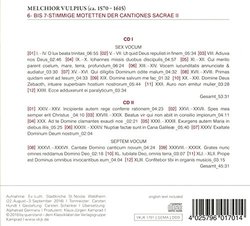| All Artists: Capella Daleminzia Title: Vulpius: 6 bis 7 Stimmige Motetten der Cantiones Sacrae II Members Wishing: 0 Total Copies: 0 Label: Querstand Release Date: 3/15/2019 Genres: Opera & Classical Vocal, Classical Style: Number of Discs: 2 SwapaCD Credits: 2 |
Search - Capella Daleminzia :: Vulpius: 6 bis 7 Stimmige Motetten der Cantiones Sacrae II
 | Capella Daleminzia Vulpius: 6 bis 7 Stimmige Motetten der Cantiones Sacrae II Genres: Opera & Classical Vocal, Classical In 1596, the Wasungen-born Melchior Vulpius was called to Weimar as the cantor, music and Latin teacher at the municipal school and the St. Peter and Paul Parish Church (Stadtkirche). Thus he became the highest ranking Ern... more » |
Larger Image |
CD Details
Synopsis
Product Description
In 1596, the Wasungen-born Melchior Vulpius was called to Weimar as the cantor, music and Latin teacher at the municipal school and the St. Peter and Paul Parish Church (Stadtkirche). Thus he became the highest ranking Ernestine church musician and the expectations of him were equally high. Within some years, he created a considerable repertoire, which he published from 1602 onwards: He released a new collection almost every year until his early death in 1615 aged 45. Many of them found their way to the cantorial library in the little Saxon town of Waldheim where they were preserved until today. Since 2002, this musical heritage has been investigated and gradually made accessible to the public once more. Waldheims cantor René Michael Röder and Capella Daleminzia directed by him now release an album series with the complete works by Vulpius. This release as Vol. 3 of the Melchior Vulpius Edition contains the 19 six-part and 5 seven-part motets of the Cantiones Sacrae II. These are mainly musical versions of psalms and Gospel texts. In this collection, Vulpius own numbering counts all single verses or text parts, resulting in a total number of 43. While the compilation of the motets of the Cantiones Sacrae II lacks the euphoria of the first part, a growing compositional maturity of the motets is noticeable in comparison to the first part.
